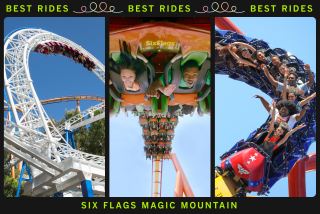Freewheeling Rock ‘n’ Rollers : 4-Wheel-Drive Club Likes Wild Roads, Woolly Rides
- Share via
One thing that four-wheel-drive vehicle users love to do is assign names to the hills they conquer.
Take Cal Gordon, the owner of a red four-wheel-drive truck and a member of the Anaheim-based Orange County 4-Play club, who came upon an unnamed hill at Big Bear recently. As his buddies Kent Herbert and Frank Hayes tell it, Gordon headed straight up the 35-degree incline, veered to the left and attempted to scale a steep stairway of rocks. Something happened and Gordon’s left front wheel flew off.
After only a half-hour of spot repairs, Gordon was back in the driver’s seat. But by that time, the hill had earned the moniker Cal’s Three-Wheel Hill.
“He didn’t realize (he was down to three wheels) or he would have made it to the top of that hill,” Hayes said. “Everybody was thinking that we would have to run back to town to get parts, but Cal had it all back together.” To the average four-wheel renegade, their sport is the best.
Frank Hayes bought his Jeep in 1977.
“I had ridden motorcycles all my life,” he said. “But I get more enjoyment out of this than I ever got out of my Harleys.”
He said that the challenge of scaling a rocky road or navigating his four wheels down a waterfall commands much more skill and thrill than simply mounting a motorcycle to ride the open highway.
“There are a few of us die-hards who go out every weekend,” he said, adding that to better equip himself for these off-road jaunts he has sunk $5,000 to $6,000 into his Jeep since April, when he joined the club.
Because there are no good four-wheeling spots in Orange County, the 50-member 4-Play club usually travels several hours to Big Bear, the Sierra Nevada mountains or Utah in search of good trails in the desert, in the mountains or at the beach. The club has even adopted a trail at Big Bear and are responsible for grooming it to their liking. Each vehicle is outfitted with safety devices, including flashlights, water, seat belts, first-aid kits, and fire extinguishers. One of the most important pieces of equipment is the winch attached to the front bumper of most vehicles.
The winch and hundreds of feet of cable help drivers pull themselves into and out of precarious positions in rivers, on rocky ledges and steep roads. As a result, many four-wheel “runs” can be measured in hours per mile rather than miles per hour.
“These are not timed events,” Hayes said. “We don’t do the stuff like you see on (television commercials) where you see Jeeps fly through the air. Speed is something you are not conscious of.”
While all that fun is going on, the 4-Play club is well aware that some people consider them trailblazing bad guys. They share most trails with mountain bikers, hikers and others, Herbert said, and that sometimes causes friction.
In addition, the federal Bureau of Land Management and the U.S. Forest Service have attempted to preserve certain sensitive landscapes in California that would be irreversibly damaged by four-wheel-drive vehicles.
Environmental groups also oppose unrestricted freewheeling.
“There are certain areas that should not be open to vehicles,” said Larry Freilich of the Southern California chapter of the Sierra Club. A particular problem, he said, exists in the desert landscape, which is covered by a fine layer of untouched soil that is easily broken by tires. “That’s creating an enormous problem in desert areas that are open and accessible . . . and is damaging soil that is incredibly, incredibly fragile.”
Freilich said that four-wheel-drive clubs can do an enormous service by fostering a strong ecological sense in their members.
“There might be 1% of people out there who are renegades and ruining it for other groups,” Freilich said. “If those clubs can reach those 1%, that would be wonderful.”
Herbert stresses that the 4-Play members stick to the roads--albeit rough ones--and observe safety precautions. In fact, 4-Play members lecture others on safety and preserving wildlife and will not hesitate to help an injured or endangered biker. Their motto is: “Tread Lightly!”
“We are battling a stereotype as bad guys,” Herbert said. “I am out there watching people (breaking the rules) and people (like the Sierra Club) are watching us.”
In a recent club newsletter, Herbert wrote of a trip to Big Bear during which the group happened upon a young girl who asked for help. Her father had a brand-new four-wheeler and had been stuck in Holcomb Creek for 45 minutes with no idea of how to get out.
The 4-Play crew pulled the vehicle from the water and encouraged the dad to join a club to learn proper techniques and meet people to travel with.
“I think we sold him on the idea of not going out alone,” Herbert said.
More to Read
Sign up for The Wild
We’ll help you find the best places to hike, bike and run, as well as the perfect silent spots for meditation and yoga.
You may occasionally receive promotional content from the Los Angeles Times.






